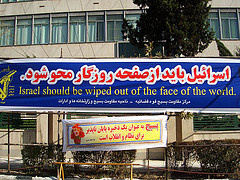http://blogs.law.harvard.edu/mesh/2008/09/growing_us_israel_gap_on_iran/

Two factors have intensified Israeli concern. The first is that despite occasional Iranian denials, Iran appears to be receiving the long-range SAM-300 anti-missile system from Russia, with installation of the missiles around Iran’s nuclear sites expected to be completed between March and September, 2009. Once these missiles are installed and operational, an attack by the Israeli air force against the Iranian nuclear installations will be much more difficult. Second, the recent deterioration of Russian-American relations which resulted from the Russian invasion of Georgia makes it even less likely than before that the UN Security Council will vote serious economic sanctions against Iran.
Despite a series of warnings from the United States and the European Union, and three very limited UN Security Council sanctions resolutions, Iran has moved ahead rapidly with its nuclear program, while at the same time developing intermediate range missiles that have the range to strike Israel. Iranian officials have announced that Iran has already installed 4,000 centrifuges at Natanz (3,000 are deemed sufficient to build a nuclear weapon), and is in the process of installing 3,000 more, with the eventual goal of more than 50,000 centrifuges.
At the same time, Iranian president Mahmoud Ahmadinejad, the leading Iranian proponent of its nuclear program, continues to call for Israel’s destruction. What worries the Israelis is that Ahmadinejad claims a mystical connection to the last Shia Imam, Muhammad al-Mahdi, and appears to believe that a cataclysmic event, such as a nuclear war with Israel, might bring about his return to earth. While Ahmadinejad does not hold the top post in Iran-that position is held by the Supreme Religious Leader, Ayatollah Khamenei-the fact that Khamenei has just endorsed Ahmadinejad for reelection is yet another concern for Israel. Despite some grumbling in Iran about the difficult economic situation (high unemployment and 26.1 percent inflation),the Khamenei endorsement most likely means that Ahmadinejad will win the next Iranian presidential elections, which are scheduled for the spring of 2009. With that victory, any hope that Iran might moderate its policies toward Israel, and make concessions about its nuclear program, will evaporate.
Meanwhile, as Israeli apprehension grows, the United States appears not only unwilling to use force itself against Iran, but is also trying to put the brakes on any Israeli attack on Iran. U.S. Secretary of Defense Robert Gates has repeatedly stated that diplomacy, not military action, should be the preferred means of dealing with Iran-apparently overlooking the fact that diplomatic activity has been a total failure up until now. In June, two leading U.S. officials, Mike McConnell, the U.S. National Intelligence Director, and Admiral Mike Mullen, the Chairman of the Joint Chiefs of Staff, visited Israel, reportedly telling the Israelis that Iran was not yet able to build a nuclear weapon and, in any case, an Israeli attack would “damage US national interests.” They repeated some of the main arguments against an Israeli attack:
- It would only retard for a short time, and not eliminate, the Iranian nuclear program, because many of the installations are hidden.
- It would rally public support around the unpopular Ahmadinejad regime.
- It would have “unpredictable consequences.”
- It would undermine U.S. policy in Iraq and Afghanistan and threaten US bases in the Persian Gulf.
The first three of these arguments are weak, if not specious. The Mossad has been working for more than two decades in Iran, and if anyone knows where Iran’s secret installations are, it is Israel. Consequently, an Israeli strike, most likely carried out by Israel’s air force and cruise-missile-firing submarines, is likely to deal a long-lasting blow to Iran’s nuclear installations-one lasting far longer than the two months to two years reportedly cited by the United States.
Second, with Ahmadinejad now backed by Khamenei for reelection, public opinion in Iran doesn’t really matter because Khamenei has the power to fix an election in favor of Ahmadinejad.
The third argument, of “unpredictable consequences,” is equally problematic. What is usually meant by this is that Iran will close the Straits of Hormuz, causing oil prices to skyrocket. What is forgotten here is that if a confrontation between Iran and the United States is inevitable-as I believe it is-then the time to confront Iran is before it obtains nuclear weapons, not afterwards, when its capability of wreaking havoc with oil prices will be far greater. A non-nuclear Iran will be able to close the Straits of Hormuz for only a limited period-days or weeks at the most-while a nuclear Iran could close them indefinitely.
The final argument, that an Israeli attack could harm U.S. interests in Iraq, Afghanistan and the Persian Gulf, carries more weight. There is no question but that Iran has influence in both Iraq and Afghanistan, and that its missiles have the range to hit U.S. bases. Iranian aid to Shia forces in Iraq could complicate the improving military situation there and delay the transfer of U.S. troops from Iraq to Afghanistan. Iran could also complicate the intensifying conflict between NATO and the Taliban in Afghanistan.
Yet if Iran plays these cards-it is already smuggling weapons and instructors into Iraq-the United States would have the opportunity to attack the bases of the Iranian Revolutionary Guard from which Iranian military aid flows into Iraq; and if Iran fires missiles at U.S. bases in the Persian Gulf, the United States, even if it doesn’t intercept all the Iranian missiles, could strike a major blow at Iranian military bases throughout Iran, something that would reduce Iran’s military capability and its ability to threaten U.S. allies in the Persian Gulf. Such a response, far from rallying the Iranian population around the Islamic regime, may bring about its demise.
In sum, the dispute over attacking Iran’s nuclear installations has caused a growing gap between the United States and Israel. Whether it will cause a major crisis between Israel and its most important ally is a very open question.



